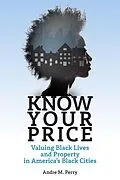The deliberate devaluation of Blacks and their communities has had very real, far-reaching, and negative economic and social effects. An enduring white supremacist myth claims brutal conditions in Black communities are mainly the result of Black people's collective choices and moral failings. That's just how they are or there's really no excuse : we've all heard those not so subtle digs. But there is nothing wrong with Black people that ending racism can't solve. We haven't known how much the country will gain by properly valuing homes and businesses, family structures, voters, and school districts in Black neighborhoods. And we need to know. Noted educator, journalist, and scholar Andre Perry takes readers on a tour of six Black-majority cities whose assets and strengths are undervalued. Perry begins in his hometown of Wilkinsburg, a small city east of Pittsburgh that, unlike its much larger neighbor, is struggling and failing to attract new jobs and industry. Bringing his own personal story of growing up in Black-majority Wilkinsburg, Perry also spotlights five others where he has deep connections: Detroit, Birmingham, New Orleans, Atlanta, and Washington, D.C. He provides an intimate look at the assets that should be of greater value to residents and that can be if they demand it. Perry provides a new means of determining the value of Black communities. Rejecting policies shaped by flawed perspectives of the past and present, it gives fresh insights on the historical effects of racism and provides a new value paradigm to limit them in the future. Know Your Price demonstrates the worth of Black people's intrinsic personal strengths, real property, and traditional institutions. These assets are a means of empowerment and, as Perry argues in this provocative and very personal book, are what we need to know and understand to build Black prosperity.
Autorentext
Andre Perry is a David M. Rubenstein Fellow in the Metropolitan Policy Program at the Brookings Institution. His research focuses on race and structural inequality, education, and economic inclusion. Perry has written on urban development and education for The New York Times, The Washington Post, The Nation and in his weekly column for The Hechinger Report.
Klappentext
Changing perceptions about the worth of African Americans and their communities
Know Your Price establishes new means of determining value of Black communities. The deliberate devaluation of Blacks and their communities, stemming from America's centuries-old history of slavery, racism, and other state-sanctioned policies like redlining have tangible, far-reaching, and negative economic and social impacts. Rejecting policies shaped by flawed perspectives, the book gives fresh insights on these impacts and provides a new value paradigm to limit them.
In the book, noted educator, journalist, and scholar Andre Perry takes readers on a guided tour of five Black-majority cities whose assets and strengths are undervalued. Perry begins the tour in his hometown of Wilkinsburg, a small city east of Pittsburgh that, unlike its much larger neighbor, is struggling and failing to attract new jobs and industry. Perry gives an overview of Black-majority cities and spotlights four where he has a deep connection to-Detroit, New Orleans, Birmingham and Washington, D.C.-providing an intimate look at the assets residents should demand greater value from.
Know Your Price demonstrates through rigorous research and thorough analysis the worth of Black people's intrinsic strengths, real property, and traditional institutions. All of these assets are means of empowerment, as Perry argues for shifting away from simplified notions of equality and moving towards maximizing equity.
Inhalt
Contents:
Acknowledgments
Introduction The Assets of Home
1. Who Runs the City
2. A Father Forged in Detroit
3. Buy Back the Block
4. A Different Kind of School
5. The Apologies We Owe to Students and Teachers
6. Having Babies Like White People
7. For the Sake of America, Elect a Black Woman President
8. "This city will be chocolate at the end of the day."
Notes
Index
